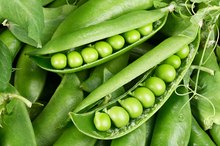Nutritional Value of Sauteed Mushrooms
Sauteed mushrooms are a common addition to steaks, poultry and pasta dishes in restaurant entrees, as well as many home-cooked meals. The 2010 Dietary Guidelines for Americans indicates that a 1-cup serving of cooked or raw vegetables, such as sauteed mushrooms, counts as one serving 1. If you eat between 1,800 and 2,100 calories, you need 2 1/2 cups of vegetables each day.
Calories and Fat
The calories in sauteed mushrooms come from both the oil used to saute the mushrooms and the mushrooms themselves. The USDA Nutrient Data Laboratory indicates that a cup of sauteed white mushrooms has 28 calories and 0.36 grams from fat 2. The fat comes primarily from polyunsaturated fats if you use vegetable oil. If you eat a cup of sauteed mushrooms, you will consume only 1.4 percent of your 2,000-calorie diet, and just a trace of the fat you need each day.
- The calories in sauteed mushrooms come from both the oil used to saute the mushrooms and the mushrooms themselves.
- The fat comes primarily from polyunsaturated fats if you use vegetable oil.
Vitamins and Minerals
Fried Mushrooms Nutritional Values
Learn More
Sauteed mushrooms have some minerals, including 4 milligrams of calcium, 12 milligrams of magnesium and 428 milligrams of potassium. You need 4,700 milligrams of potassium for the proper functioning of your muscular system, and about 320 to 420 milligrams of magnesium a day. Other minerals present in mushrooms include 13 milligrams of sodium, a trace of zinc and copper, and 15 micrograms of selenium. Mushrooms have no vitamin C, 22 micrograms of folate and 4.3 milligrams of niacin. Your body uses niacin for your skin's health and your nervous system's ability to function, according to TeensHealth. You need about 14 to 16 milligrams a day. The sauteed vegetables have no vitamin A or vitamin E, and just a trace of vitamin D.
- Sauteed mushrooms have some minerals, including 4 milligrams of calcium, 12 milligrams of magnesium and 428 milligrams of potassium.
- Other minerals present in mushrooms include 13 milligrams of sodium, a trace of zinc and copper, and 15 micrograms of selenium.
Protein and Fiber
Even though the mushrooms themselves have few calories, a 1-cup serving of sauteed mushrooms gives you almost 4 grams of protein. The 4 grams equates to almost 9 percent of a woman's needs and 7 percent of a man's protein requirements. In addition to protein, a cup of mushrooms has 1.9 grams of fiber. Fiber aids in digestion and helps you feel more full. A woman's fiber needs range from 22 to 28 grams, and a man's fiber requirements range from 28 to 34 grams, according to the U.S. Department of Agriculture's Dietary Guidelines 1.
- Even though the mushrooms themselves have few calories, a 1-cup serving of sauteed mushrooms gives you almost 4 grams of protein.
Considerations
Calories in Veggie Lasagna
Learn More
While mushrooms count as part of your vegetable requirement, sauteed mushrooms' relatively low amounts of vitamins and minerals make them a less desirable choice than vegetables that are rich in nutrients such as spinach, broccoli or tomatoes. When sauteeing mushrooms, use a small amount of heart-healthy olive oil to add monounsaturated fats to your diet, and add other nutrient-rich vegetables to increase the dietary value of your dish.
Related Articles
References
- U.S. Department of Agriculture: Dietary Guidelines for Americans 2010
- USDA Nutrient Data Laboratory: Mushrooms, White, Stir-Fried
- TeensHealth; "Minerals"; Mary Gavin; September 2009
- TeensHealth; Vitamins; Mary Gavin; September 2009
- Fun with funghi: Garnish your meals with mushrooms. Academy of Nutrition and Dietetics. Updated January 17, 2019.
- Mushrooms, raw. FoodData Central. U.S. Department of Agriculture. Published April 1, 2019.
- Nakashima A, Yamada K, Iwata O, et al. β-Glucan in foods and its physiological functions. J Nutr Sci Vitaminol. 2018;64(1):8-17. doi:10.3177/jnsv.64.8
- Lo HC, Wasser SP. Medicinal mushrooms for glycemic control in diabetes mellitus: History, current status, future perspectives, and unsolved problems (review). Int J Med Mushrooms. 2011;13(5):401-26. doi:10.1615/IntJMedMushr.v13.i5.10
- Institute of Medicine (US) Panel on Micronutrients. Dietary Reference Intakes for vitamin A, vitamin K, arsenic, boron, chromium, copper, iodine, iron, manganese, molybdenum, nickel, silicon, vanadium, and zinc. Washington (DC): National Academies Press (US); 2001.
- Potassium. Fact Sheet for Professionals. National Institutes of Health Office of Dietary Supplements. Updated March 2, 2020
- Iron. Fact Sheet for Professionals. National Institutes of Health Office of Dietary Supplements. Updated December 19, 2019
- Wasser SP. Medicinal mushroom science: History, current status, future trends, and unsolved problems. Int J Med Mushrooms. 2010;12(1):1-16. doi:10.1615/IntJMedMushr.v12.i1.10
- Chaturvedi VK, Agarwal S, Gupta KK, Ramteke PW, Singh MP. Medicinal mushroom: Boon for therapeutic applications. 3 Biotech. 2018;8(8):334. doi:10.1007/s13205-018-1358-0
- Cheung PCK. The nutritional and health benefits of mushrooms. Nutr Bull. 2010;35(4):292-299. doi:10.1111/j.1467-3010.2010.01859.x
- Kalaras MD, Richie JP, Calcagnotto A, Beelman RB. Mushrooms: A rich source of the antioxidants ergothioneine and glutathione. Food Chem. 2017;233:429-433. doi:10.1016/j.foodchem.2017.04.109
- Feng L, Cheah IK, Ng MM, et al. The association between mushroom consumption and mild cognitive impairment: A community-based cross-sectional study in Singapore. J Alzheimers Dis. 2019;68(1):197-203. doi:10.3233/jad-180959
- Vitamin D. Fact Sheet for Professionals. National Institutes of Health Office of Dietary Supplements. Updated March 24, 2020
- Keegan RJ, Lu Z, Bogusz JM, Williams JE, Holick MF. Photobiology of vitamin D in mushrooms and its bioavailability in humans. Dermatoendocrinol. 2013;5(1):165-76. doi:10.4161/derm.23321
- McRae MP. Dietary fiber intake and type 2 diabetes mellitus: An umbrella review of meta-analyses. J Chiropr Med. 2018;17(1):44-53. doi:10.1016/j.jcm.2017.11.002
- Ferreira H, Alves M, Pineda F et al. Cross-reactivity between molds and mushrooms. Pediatr Allergy Immunol and Pulmonol. 2017;30(2):126-128. doi:10.1089/ped.2017.0746
- North American Mycological Association. Mushroom poisoning syndromes.
- Nardozzi, C. The National Gardening Association. Learning Library. Edible Landscaping - Edible of the Month: Two Simple, Beginner Mushrooms.
- Mushrooms, canned. FoodData Central. U.S. Department of Agriculture. Published April 1, 2019.
Writer Bio
Diane Lynn began writing in 1998 as a guest columnist for the "Tallahassee Democrat." After losing 158 pounds, she wrote her own weight-loss curriculum and now teaches classes on diet and fitness. Lynn also writes for The Oz Blog and her own blog, Fit to the Finish. She has a Bachelor of Science in finance from Florida State University.









